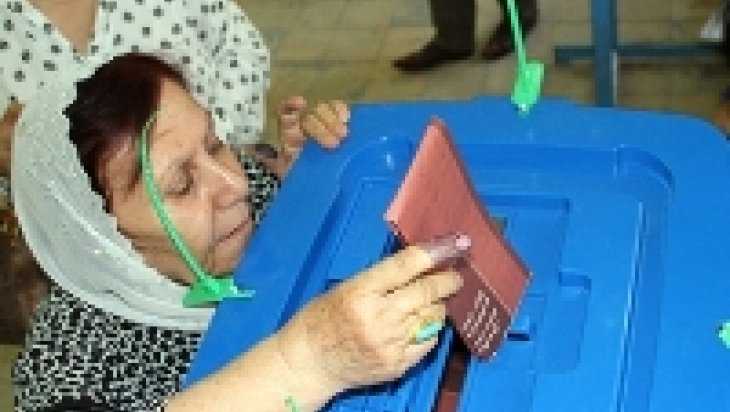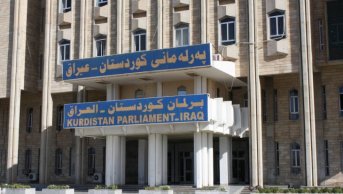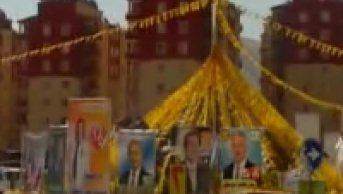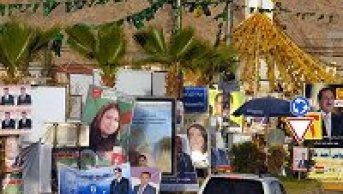Kurdistan Regional Government Parliamentary Election Results and the KRG's Future

The official results of the elections that took place in Iraq's Kurdistan Regional Government (KRG) on Sept. 21 were revealed on Sept. 28.
It was announced that 95 percent of the votes had been counted and that the remaining 5 percent were those cast during the special voting. Iraq's Independent High Electoral Commission has not announced the party vote percentages and the number of the seats won by the political parties in the election. There may be little change in the number of seats determined so far. Nevertheless, a general picture of the election has become clear. The winner is the Kurdistan Democratic Party (KDP), followed by the Gorran (Change) Movement and the Patriotic Union of Kurdistan (PUK). According to the results announced so far, seemingly the KDP and the Gorran Movement have increased the number of votes they received this year when compared to the 2010 elections while other parties lost votes compared to previous years.
In the following analysis, this subject will be discussed in detail. But overall observations regarding the election results so far can be listed as follows:
1. The parliamentary elections clearly show the change in the political balance of the KRG. The two-party system, the most important characteristic of the post-1975 Iraqi Kurdish politics, no longer exists. The political dynamics stemming from the conflict and/or collaboration between the KDP and the PUK have been replaced by a multi-equilibrium game and a more complex structure.
2. The most successful parties in the elections were the KDP and the Gorran Movement. The PUK and Islamist parties, on the other hand, are in decline.
3. The KDP is the only political party that has increased both its votes and the number of seats it holds. Although Gorran also increased its votes, it lost a seat in parliament. The PUK has lost both a substantial number of its votes and seats. While the Kurdistan Islamic Union (KIU) and Kurdistan Islamic Group (KIG) have lost votes, they increased their number of seats. It wouldn't be wrong to say that the PUK is the party that emerged the biggest loser in the latest KRG parliamentary election.
4. The number of votes in the last three elections (2009, 2010, 2013) has once more showed that; Gorran plus the PUK is greater than the KDP. However, the nature of KRG politics does not allow for that equation.
5. Although the election results show that none of the parties has received majority in parliament, it could be suggested that the KDP, which won 38 seats, has control over at least 50 or 51 seats. This situation makes it the most significant party of the 111-seat parliament and hampers scenarios of a government without the KDP.
6. Despite the fact that the PÇDK (Kurdistan Democratic Solution Party) entered the elections, the approximately 3,500 votes they received showed once again that the party is very weak in the KRG.
7. The election results indicate that none of the parties can form a government alone. Currently, various scenarios can be written for the government. However, the most applicable scenario is the formation of a government with broad participation (including the KDP, the PUK, the Gorran Movement, the KIU, the KIG and other small parties), led by Prime Minister Nechervan Barzani. Although the opposition parties mention possibilities of a government without the KDP, this seems highly unlikely.
8. The impact of the election on the political balance in the region will become more visible in the near future. The results of the KRG provincial council elections on Nov. 21, 2013, if held, will not be the same as those of this most recent election. However, it might be suggested that arguments regarding an extension of President Masoud Barzani's term in office and the vote on Iraqi Kurdistan's constitution, as well as the referendum process, will be much more harsh.
9. How the opposition will be shaped is as important as who will come to power in the near future. The PUK's fate will affect the KDP, the Gorran Movement and the KIG, as well. At this point, the vital question is: Will the PUK's erosion make the KDP unrivaled? Or, will the Gorran Movement take over from the PUK and become the new power of the two-party system? Considering the role the PUK has assumed in Kurdish politics in the Middle East over the past 35 years (from Syria to Iran, from Kirkuk to Baghdad and even in milestones regarding the Kurdistan Workers' Party [PKK]), the answer to this question has the potential to affect not only the power balance within the KRG, but also the power balance between Kurdish political groups in Syria, Iran and even Turkey.
In light of these observations, it would be helpful to make an assessment of the PUK to estimate political balances in the KRG in the near future.
Why did the PUK lose?
All political authorities in the region acknowledge that the Patriotic Union of Kurdistan, one of the two major parties of the region, has lost power to a great extent. As a matter of fact, prominent figures of the PUK such as party Deputy Chairman Kosrat Rasul, Deputy Secretary-General Barham Saleh, and Mullah Bahtiyar explicitly or implicitly stated that they couldn't achieve what they had hoped to in the elections and that they failed. So, what might be the reasons for the PUK's loss of power, which has been one of the two major parties of the region -- the other being the KDP -- for years?
1- Organizational problems: The PUK has been facing organizational problems since 2006. In fact, the PUK, which is composed of different factions, has been witnessing a power struggle among certain groups within the party and their prominent figures since 2000. In 2005, some adjustments were made due to disturbances within the party, but the conflicts within the PUK increased after the elections and a faction led by Current leader of the Gorran Movement, Nawshirvan Mustafa split from the PUK in 2006. Then, his departure was followed by those of certain figures of PUK abroad. The turmoil in the party reached such a level during that period that last Iraqi Kurdistan Parliament Speaker Arslan Bayez, Deputy Prime Minister Imad Ahmad and PUK Politburo member Mullah Bahtiyar also criticized the party. Even though the PUK overcame the turmoil between 2006-2008 through the great efforts of current President of Iraq Jalal Talabani, the party suffered considerably from the turmoil.
The unexpected success in the 2009 parliamentary elections for the Gorran Movement, established by Nawshirvan Mustafa, left the PUK in a more difficult situation. Finally in 2010, the PUK held a congress and sought solutions to the problems. The congress came up with temporary solutions, but it pointed out that a stronger power struggle would take place in the long term. The last straw on this issue was Talabani's health problem. The absence of Talabani, known to have had health problems for a long time, revealed the power struggle within the PUK. To sum up, the PUK's decade of organizational problems and the power struggle within the party for the post-Talabani era are one of the reasons for the PUK's recent failure in the election.
2- Alliance with the KDP: The most frequent criticism of the PUK in recent years is for its alliance with the KDP. The strategic alliance, being the basis of stability in the KRG after the invasion of Iraq, paved the way for the KDP and the PUK to come to power without the pressure of other political powers. However, the conflicts within the PUK since 2006 were also caused by the problems with the KDP. Although the alliance between the two parties was welcomed by the grassroots of both parties for a while as a factor in the stability of the KRG, it is clear that there is strong opposition within the PUK's grassroots. There are two reasons underlying the criticism of the KDP by the PUK's grassroots supporters: The first is that the PUK's grassroots do not like the KDP's leadership and grassroots, as they are political movements that historically come from different ideologies. Secondly and more importantly, the KDP does not treat the PUK as its equal partner, a fact also stated by some authorities in the PUK. Even though the power shared by the two parties seemed equal in early stages of the alliance, there has been a substantial rise in the number of those in the PUK who believe that the KDP has been looking down on the PUK since 2009. The fact that Deputy Prime Minister Barham Saleh's term of office was not extended and that government services were mostly brought to districts that support the KDP under Barzani increased the unease among the PUK's grassroots. It could be suggested that many people in the PUK got the idea that being a part of the government was mainly favoring the KDP. Therefore, it wouldn't be wrong to assert that PUK supporters preferred not to go to the polls, rather than support the government and keep the KDP in power. The PUK grassroots' reaction to Barzani is especially noteworthy. The PUK supporting the extension of Barzani's term in office was the last straw for the PUK's grassroots.
3- Ambiguity of Talabani's future: Talabani is one of the most respected leaders of the Iraqi Kurds. It wouldn't be wrong to say that his leadership could have changed the election results. However, the expectation regarding Talabani's withdrawal from politics in the near future kept some loyal party electors from going to the polls. The great majority of people in the PUK believe that Talabani has already died and that his death has not been announced due to the elections. Nevertheless, it is known that there are a lot of people who could change their vote up until the last moment at a single word from Talabani. However, it might also be suggested that the lack of the expected message from Talabani caused disappointment in many people. The main election slogan of the PUK, which was “Vote for Mam Jalal,” remained weak due to the lack of message. Considering that the post-Talabani PUK will grow weaker with the aforementioned organizational problems, it might be asserted that a certain group of people withdrew their support.
4- Electioneering and campaigning: Despite all the opportunities the PUK had, it failed to run a successful election campaign. Although hundreds of thousands of banners and flags were distributed all across the cities in the region, it did not create realistic electioneering. The PUK sought to create an appearance during the election process. But this appearance focused on convincing people that the party grassroots is still powerful. The rhetoric and emphasis of candidates and even their campaigns gave the impression that the historical mission was being highlighted, rather than trying to convince people that the PUK will grow stronger in the future. The PUK has a historical background and this historical mission is, by all means, important for hundreds of thousands of people in the KRG. Nevertheless, the youth and educated segments in this region with rapid population growth are in search of the future. The young generation considers the Gorran Movement the opposition and the KDP the party in power. The PUK, on the other hand, is excluded from the possibility of becoming the party of today or the future by referencing its historical mission. This situation causes a decline in support for the PUK among the new generation.
Post-election PUK and its future
Although the PUK has lost power compared to the previous elections, it still holds the key to the government that is to be formed. The PUK is the first party that both the KDP and the Gorran Movement would resort to for a possible government. The approach the PUK has adopted so far indicates that it will take part in the government with the KDP. At this point, it appears that this is the most reasonable option for the PUK to regain power in government. The developments that have taken place over the past two decades make people think that the PUK's presence in the opposition wouldn't bring any power to the party. It might be asserted that there are currently three ways for the PUK to do politics in the region: To attain power by distributing resources efficiently by being in power; to gather the current reaction under its own roof by taking part in the opposition and by expressing the distortions of the system; and to broaden grassroots support by pursuing an ideology-based policy. Even though the PUK first emerged as a party of ideology, it has long lost this character. The party policy that it has been following since 1992, on the other hand, is included in the first category. Therefore, it is highly unlikely that the PUK, which does not have a share in power, could pull itself together in the near future. Beyond the aforesaid point, the most important dynamic that would define the near future of the PUK would be the power struggle within the party. Talabani's health condition is the most critical point of the struggle. As expected by many people, if it is announced that Talabani is dead, the quiet but deep power struggle within the party could become more visible. During this process, new fractions and splits from the party could take place. At this point, the PUK's position in the power balance of the KRG in the medium and long term depends on how much longer the power struggle will continue and whether the party will be able to maintain its unity and integrity through this struggle. To what extent the PUK can maintain itself as a political party concerns not only itself, but also others, in terms of how much the opposition parties and the parties in power could take from the PUK. The PUK's future could affect the general political balances in Iraq. It is impossible for Talabani to maintain his position as Iraqi president in the coming period. However, who will replace Talabani is a very important object at issue. Iraqi Kurds consider the presidency a bridge between themselves and Baghdad. Considering the internal dynamics of the relations between Erbil and Baghdad, it is obvious that Kurds wouldn't consent to less. Nevertheless, who and which political party takes the position will affect the internal balances in the KRG. More importantly, whether a joint Kurdish list is formed in the general elections of Iraq to be held in 2014 will be of critical importance in terms of affecting Iraqi Kurds' position in parliament in Baghdad.









